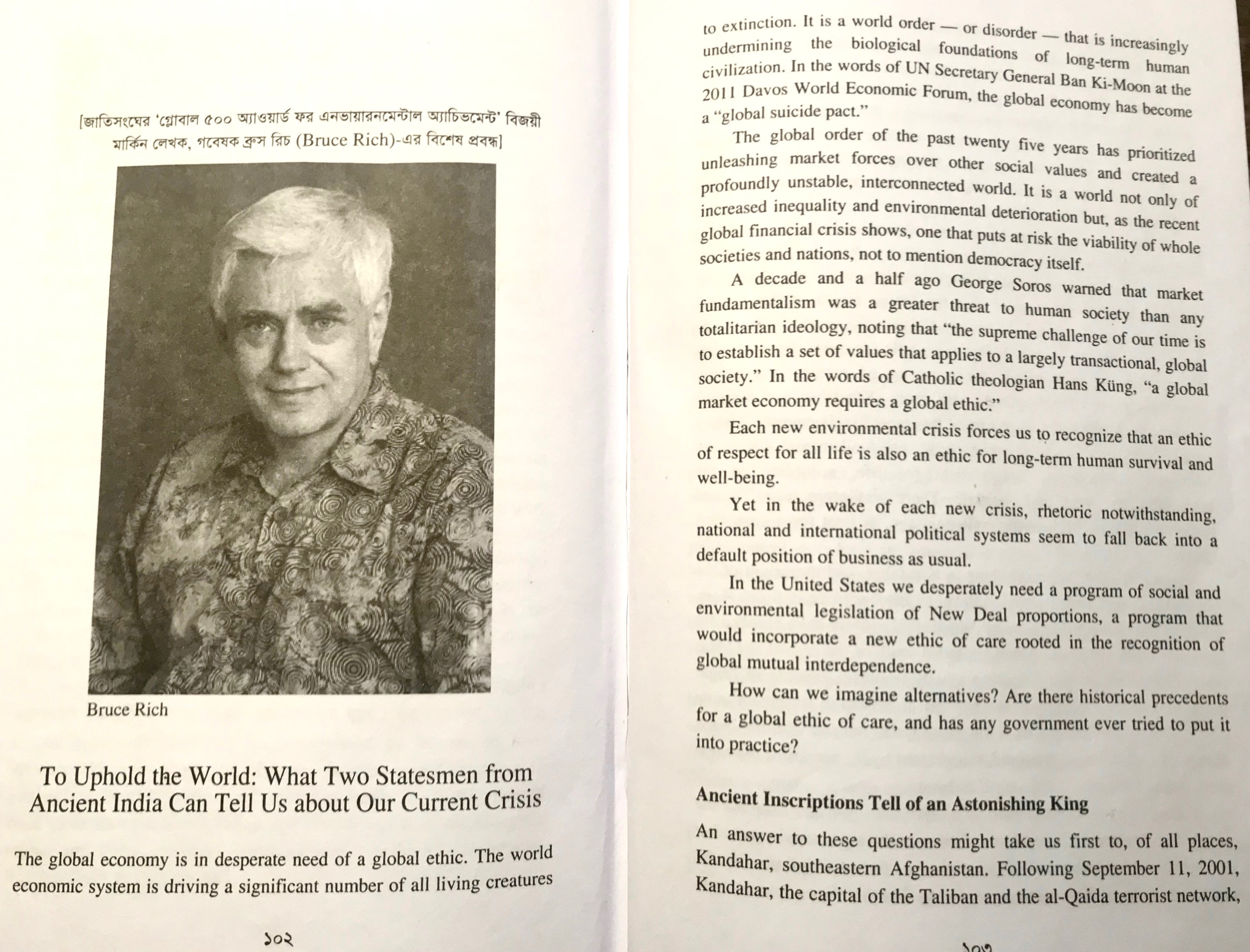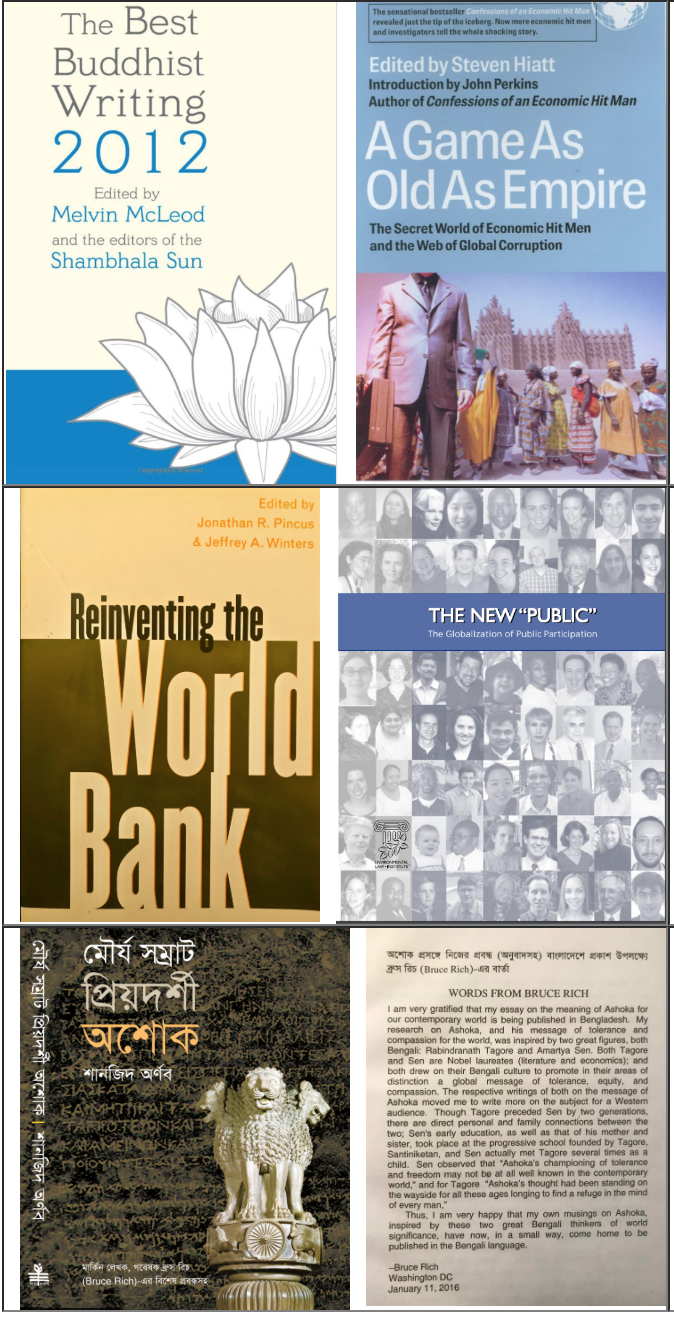This section has material on four chapters I authored in four different books, plus a preface and essay I authored for a book on Ashoka published in Bengali in Bangladesh in 2016.
1. The Best Buddhist Writing 2012, "To Uphold the World" (Chapter)
 "To Uphold the World," The Best Buddhist Writing 2012, editor, Melvin Mcleod and the editors of Shambala Sun (Shambala: Boston and London, 2012), pp. 159-67.
"To Uphold the World," The Best Buddhist Writing 2012, editor, Melvin Mcleod and the editors of Shambala Sun (Shambala: Boston and London, 2012), pp. 159-67.
Amazon.com link: https://www.amazon.com/Best-Buddhist-Writing-2012/dp/1611800110
"A treasury of the most notable, profound, and thought-provoking Buddhist-inspired writing published in the last year." The Best Buddhist Writing 2012 includes:
• His Holiness the Dalai Lama on cultivating a universal ethic of kindness
• Sharon Salzberg on getting your meditation practice started
• Pema Chödrön on how to smile at fear
• The Venerable Bhikkhu Bodhi on analyzing global problems through the lens of traditional Buddhist teachings
• Bruce Rich on the enlightened model of government of the Buddhist monarch King Ashoka
• Thich Nhat Hanh on fidelity in loving relationships
• Barry Boyce’s fascinating survey of the life and teachings of the late Chögyam Trungpa Rinpoche
• Michael Stone and David Loy on the basic questions raised by the Occupy Wall Street movement
• Diane Ackerman on living with her beloved husband’s Alzheimer’s disease
• Yangzom Brauen’s moving account of her grandmother and mother’s escape from Tibet following the Chinese invasion
• And much more
2, A Game as Old as Empire, "Exporting Destruction" (Chapter 10)
 "Exporting Destruction," A Game As Old As Empire: The Secret World of Economic Hit Men and the Web of Global Corruption, editor Steven Hiatt, (San Francisco: Berrett-Koehler Publishers, Inc., 2007), Chapter 10, pp. 197-218.
"Exporting Destruction," A Game As Old As Empire: The Secret World of Economic Hit Men and the Web of Global Corruption, editor Steven Hiatt, (San Francisco: Berrett-Koehler Publishers, Inc., 2007), Chapter 10, pp. 197-218.
Amazon.com link: https://www.amazon.com/Game-As-Old-Empire-Corruption/dp/1576753956/ref=tmm_hrd_swatch_0?_encoding=UTF8&qid=&sr=
"With chapters spotlighting how specific countries around the globe have been subverted, A Game As Old As Empire uncovers the inner workings of the institutions behind these economic manipulations. The contributors detail concrete examples of how the “economic hit man game” is still being played: an officer of an offshore bank hiding hundreds of millions of dollars in stolen money, IMF advisers slashing Ghana’s education and health programs, a mercenary defending a European oil company in Nigeria, a consultant rewriting Iraqi oil law, and executives financing warlords to secure supplies of coltan ore in Congo. Together they show how this system of corruption and plunder operates in real life, and reveal the price that the rest of the world must pay as a result."
"Chapter 10. Exporting Destruction, Bruce Rich: Export credit agencies have quietly become the world’s largest financial institutions, backing $788 billion in trade in 2004. Secretive and largely unregulated, they pursue a single mission: boost overseas sales of their countries’ multinational corporations. In doing so, they’ve become some of the dirtiest players in the EHM game, financing nuclear power plants in countries that can’t manage them and massive arms sales to strife-torn regions—all lubricated by billions of dollars in bribes. Bruce Rich looks at the secretive world of ECAs and the damage they cause around the world."
3. Reinventing the World Bank, "The World Bank Under James Wolfensohn," (Chapter 2)
 The World Bank Under James Wolfensohn," Reinventing the World Bank, edited by Jonathan R. Pincus and Jeffrey A. Winters, (Ithaca and London: Cornell University Press, 2002), Chapter 2, pp. 26--53." Amazon.com link:https://www.amazon.com/Reinventing-World-Bank-Jonathan-Pincus/dp/0801487927/ref=sr
The World Bank Under James Wolfensohn," Reinventing the World Bank, edited by Jonathan R. Pincus and Jeffrey A. Winters, (Ithaca and London: Cornell University Press, 2002), Chapter 2, pp. 26--53." Amazon.com link:https://www.amazon.com/Reinventing-World-Bank-Jonathan-Pincus/dp/0801487927/ref=sr
"In a book neither funded nor controlled by its subject, leading North American and British scholars critically examine the World Bank. They contend that an institution that has grown to unmanageable proportions through internally driven change cannot realistically be expected to effect its own reform program. All the Bank's previous attempts at self-redesign have failed, and the contributors argue it is beyond reform; it must be reinvented."
Review Quotes:
"The World Bank has had a larger role in shaping economic policy in the developing world than any other institution. Reinventing the World Bank is a searching, no-holds-barred examination of the institution. Even well-informed readers will find it difficult to think about the World Bank in quite the same way after reading this book." ―Dani Rodrik, Harvard University
"When the infamous Willie Sutton was asked why he robbed banks he is reported to have replied, "Because that's where the money is." A new book shows how important this aphorism is when talked aobut the taxpayer-supported multilateral development banks. Reinventing the World Bank not only conclude that the world's largest development bank is failing, but that reform can be achieved only by increasing accountability through outside oversight." ―Martin Edwin Anderson, former Assistant Professor, National Defense University
"The book's strengths include accessibility, detailed knowledge of the politics and operations of the World Bank, and a well-known list of contributors." ―Christopher Kilby, Vassar College, Journal of Economic Literature
"We sorely need a sophisticated political sociology of international financial institutions and this fine volume is an important step in that direction. It presents an informed and balanced view of an embattled organization that some regard as too unwieldy to be reinvented, even reformed. The stakes are high; the issues real. Reinventing the World Bank will be an asset to scholars, students, and policy makers of all stripes."―Thomas Callaghy, University of Pennsylvania
4. The New "Public: The Globalization of Public Participation, "Public Participation and Official Export Credit Agencies" (Chapter)
 "Public Participation and Transparency at Official Export Credit Agencies," Bruce Rich and Tomas Carbonell, The New "Public": The Globalization of Public Participation, Carl Bruch, Editor, (Washington DC: Environmental Law Institute, 2002), pp. 175--192.
"Public Participation and Transparency at Official Export Credit Agencies," Bruce Rich and Tomas Carbonell, The New "Public": The Globalization of Public Participation, Carl Bruch, Editor, (Washington DC: Environmental Law Institute, 2002), pp. 175--192.
Full book can be downloaded gratis at: https://www.eli.org/sites/default/files/eli-pubs/d1205.pdf
"The New Public: The Globalization of Public Participation...takes a close look at the foundations of public involvement, and regional and international institutions that advance public involvement. The book, whose release coincides with the 2002 World Summit on Sustainable Development (WSSD) in Johannesburg, South Africa, highlights cases from Africa, the Americas, Europe, and Asia, illustrating the common need and experiences in promoting a core set of principles for public input in effective decisionmaking. The book highlights how public involvement is essential to the long-term success and sustainability of endeavors in a wide range of cultures, political systems, and levels of economic development....Rich and Carbonell highlight numerous examples where projects supported by export credit agencies were delayed due to public protest arising in part from a lack of adequate public participation."
From the chapter "Public Participation and Transparency at Official Export Credit Agencies":
"Export credit agencies (ECAs) are now the world’s largest source of official finance for developing countries, supporting major infrastructure projects, industrial installations, and resource extraction schemes in almost every corner of the globe. Despite their prominent role in facilitating international trade and investment, and despite the significant environmental and social impacts of their activities, ECAs have resisted measures to improve the transparency of their operations and increase public participation in their projects. This chapter makes the case for increased transparency and public participation in this critical, but frequently neglected, class of financial institutions. Specific policy recommendations in this area are presented, and objections to ECA reform are identified and rebutted. While not a principal focus of this chapter, the need for access to justice with respect to ECA-backed projects is also highlighted and addressed in the policy recommendations section."
5. Bangladesh--Bengali language anthology on Ashoka (2016), with an introduction and essay by the author
"Words From Bruce Rich" http://brucemrich.com/storage/photos/shares/BOOKS/BookAnthol_2016_Rich_BengaliAshokaAnth_Intro.pdf


"I am very gratified that my essay on the meaning of Ashoka for our contemporary world is being translated and published in Bengali. My research on Ashoka, and his message of tolerance and compassion for the world, was inspired by two great figures, both Bengali: Rabindranath Tagore and Amartya Sen. Both Tagore and Sen are Nobel laureates (literature and economics); and both drew on their Bengali culture to promote in their areas of distinction a global message of tolerance, equity, and compassion. The respective writings of both on the message of Ashoka moved me to write more on the subject for a Western audience. Though Tagore preceded Sen by two generations, there are direct personal and family connections between the two; Sen's early education, as well as that of his mother and sister, took place at the progressive school founded by Tagore, Santiniketan, and Sen actually met Tagore several times as a child. Sen observed that “Ashoka’s championing of tolerance and freedom may not be at all well known in the contemporary world," and for Tagore, “Ashoka’s thought had been standing on the wayside for all these ages longing to find a refuge in the mind of every man." Thus, I am very happy that my own musings on Ashoka, inspired by these two great Bengali thinkers of world significance, have now, in a small way, come home to be published in the Bengali language.--Washington DC, January 11, 2016" On exhibit
My essay in the book, published in English (right) and also translated into Bengali (image below), was a modified version of my piece that appeared in Tikkun in 2011:

Below right: on exhibit at the annual Dhakka book fair

:



